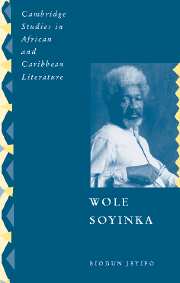Book contents
- Frontmatter
- Contents
- Preface
- Chronology
- List of abbreviations
- Chapter 1 ‘Representative’ and unrepresentable modalities of the self: the gnostic, worldly and radical humanism of Wole Soyinka
- Chapter 2 Tragic mythopoesis as postcolonial discourse – critical and theoretical writings
- Chapter 3 The “drama of existence”: sources and scope
- Chapter 4 Ritual, anti-ritual and the festival complex in Soyinka's dramatic parables
- Chapter 5 The ambiguous freight of visionary mythopoesis: fictional and nonfictional prose works
- Chapter 6 Poetry, versification and the fractured burdens of commitment
- Chapter 7 “Things fall together”: Wole Soyinka in his Own Write
- Notes
- Bibliography
- Index
Chapter 4 - Ritual, anti-ritual and the festival complex in Soyinka's dramatic parables
Published online by Cambridge University Press: 22 September 2009
- Frontmatter
- Contents
- Preface
- Chronology
- List of abbreviations
- Chapter 1 ‘Representative’ and unrepresentable modalities of the self: the gnostic, worldly and radical humanism of Wole Soyinka
- Chapter 2 Tragic mythopoesis as postcolonial discourse – critical and theoretical writings
- Chapter 3 The “drama of existence”: sources and scope
- Chapter 4 Ritual, anti-ritual and the festival complex in Soyinka's dramatic parables
- Chapter 5 The ambiguous freight of visionary mythopoesis: fictional and nonfictional prose works
- Chapter 6 Poetry, versification and the fractured burdens of commitment
- Chapter 7 “Things fall together”: Wole Soyinka in his Own Write
- Notes
- Bibliography
- Index
Summary
In the selection of pretenders, a new ‘king maker’ takes part, it is ritual legitimation, the ability to rely on ritual, to fulfill it and use it, to allow oneself, as it were to be borne aloft by it … Because of this dictatorship of the ritual, however, power becomes clearly anonymous. Individuals are almost dissolved in the ritual … (and) it seems as though ritual alone carries people from obscurity to the light of power.
Vaclav Havel, The Power of the PowerlessThe plays discussed in this chapter are amongst Soyinka's most ambitious and most memorable dramas, but are also the most pessimistic in his dramatic corpus: A Dance of the Forests, The Road, Madmen and Specialists, Death and the King's Horseman and The Bacchae of Euripides. Moreover, in terms of form and craft, and of language and ideas, Soyinka is at his most resourceful and most vigorous in this group of dark, brooding plays. Because each of these plays deals with, or derives directly from a major historical event or crisis, the dramatist's artistic resourcefulness in the plays seems in turn to be linked to that element in his career as a dramatist that we have identified in Chapter 3 of this study as the imperative of appropriate response.
- Type
- Chapter
- Information
- Wole SoyinkaPolitics, Poetics, and Postcolonialism, pp. 120 - 166Publisher: Cambridge University PressPrint publication year: 2003



